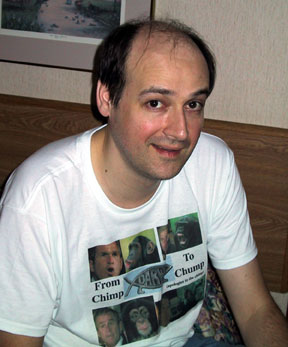(I heard about the recent events through the Movement for a Democratic Society announcement list.)
Here is what Oliver Sacks wrote about the legacy of the 1988 Deaf President Now student strike at Gallaudet University, the world’s only liberal-arts university designed for deaf and hard-of-hearing students, and a backbone of Deaf culture in the United States. This is from his beautiful book, Seeing Voices:
All sorts of changes, administrative, educational, social, psychological, are already beginning at Gallaudet. But what is clearest at this point is the much-altered bearing of its students, a bearing that conveys a new, wholly unself-conscious sense of pleasure and vindication, of confidence and dignity. This new sense of themselves represents a decisive break from the past, which could not have been imagined just a few months ago.
But has all been changed? Will there be a lasting transformation of consciousness
? Will deaf people at Gallaudet, and the deaf community at large, indeed find the opportunities they seek? Will we, the hearing, allow them these opportunities? Allow them to be themselves, a unique culture in our midst, yet admit them as co-equals, to every sphere of activity? One hopes the events at Gallaudet will be but the beginning.
–Oliver Sacks, Seeing Voices: A Journey Into the World of the Deaf (ISBN 0-06-097347-1), pp. 162–163.
Unfortunately, the answer from the Gallaudet University administration and Board of Trustees–even those who were direct beneficiaries of the Deaf President Now
movement–appears to be No, not yet.
Here’s the story from The Washington Post (2006-10-07):
Hundreds of protesters took over the main classroom building at Gallaudet University on
Thursday night and refused to leave yesterday, demanding that the board of trustees reopen
the search for a president.
With trustees meeting on campus and celebrating outgoing President I. King Jordan,
students pitched tents outside the entrances to Hall Memorial and blocked the doors. Inside,
trash cans and desks held elevator doors ajar, and the floor was covered with sleeping bags,
cans of energy drink and fliers that spread messages to the school for the deaf: THE
BOARD OF TRUSTEES WON’T LISTEN TO US!
and DO NOT LET ANYONE
IN.
When security officers arrived early yesterday, students said, they couldn’t understand what
officers were saying — that officers gave orders without sign language and did not seem to
understand that the protest was peaceful. Some people were injured when officers shoved
their way through and used pepper spray, students said.
A lot of people are scared,
Leah Katz-Hernandez wrote on a neon yellow notepad,
and some faculty members were in tears as they signed with students.
Communication with security staff is an emotional issue at the university. In 1990, a student
died while being restrained by security officers; his hands were cuffed, so he couldn’t use
sign language.
The administration has denied that pepper spray was used and said that officers used sign
language and that no students were hurt.
… The choice of the school’s next leader has divided campus since the spring, prompting
faculty no-confidence votes and protests last semester and continuing opposition by a
coalition of faculty, students, staff and alumni. In a scene reminiscent of student takeovers of
District universities in past decades, protesters barricaded doors and refused to compromise.
At some schools for the deaf elsewhere in the country, groups pitched tents and made signs
supporting the Gallaudet protesters.
The leaders of the National Association of the Deaf issued an open letter saying the campus
is in crisis
and asking the board to exercise leadership and for the university to
immediately cease any confrontational tactics toward campus faculty, students, and
staff.
…
In May, when the board of trustees announced that then-Provost Jane K. Fernandes would be
the next president of Gallaudet University, students stood up and walked out of the
auditorium, climbed onto the front gates and began to protest.
They said that the search process was unfair, that Fernandes was not strong enough to lead
a school often seen as the cultural backbone of the deaf world and that the board had ignored
their concerns.
Because longtime President I. King Jordan swept into office after students demanded a
deaf president now
and started a civil rights movement, the selection of Fernandes
had particular weight for the deaf community.
— Susan Kinzie and Nelson Hernandez, Washington Post (2006-10-07): Protesters Occupy Gallaudet Classroom Building
From The Washington Post (2006-10-10):
Since May, protesters say, the university has only become more deeply divided.
What is her plan? And, what is she waiting for? She had all summer to bring the
community together, but as you can see, [that] didn’t happen,
wrote Andrew J. Lange,
president of the Gallaudet University Alumni Association, which is setting up an independent
Web site because it cannot send e-mail to alumni without university approval.
The second wave of demonstrations began last week when the board of trustees met on
campus. Protesters say that the way Fernandes was chosen was unfair and that the board
has ignored people on campus for too long.
Last night, hundreds of students agreed to spend one more night in the classroom building.
They awaited a response from administrators to a proposal that they would leave the building
if the university satisfied 24 demands, including guaranteeing their right to protest in specific
areas.
The students also are seeking a public apology from university President I. King Jordan,
whom they accuse of making misleading statements about the protesters. The students are
not backing down from their original demands to reopen the presidential search process and
to guarantee that protesters would not be retaliated against.
In May, faculty members passed a series of no-confidence votes after it was announced that
Fernandes, then the provost, would become president.
Trustees have said that their decision is nonnegotiable and that they have chosen the
strongest candidate. This summer, Fernandes stepped down as provost to work on her
transition to the presidency.
… Jordan, who is stepping down at the end of this year, said yesterday that Fernandes’s leadership since May has been outstanding.
— Susan Kinzie, Washington Post (2006-10-10): Intensity of Gallaudet Unrest Surprised Incoming Leader
From The Washington Post (2006-10-14): Dozens of Protesters Arrested On Gallaudet President’s Order:
Campus police arrested dozens of student demonstrators at Gallaudet University last night
to reopen the famed college for the deaf after a three-day shutdown staged in a
long-simmering protest over the appointment of a new president.
The arrests began shortly before 9 p.m., when police began carrying away students from a
jeering throng that had been blocking the school’s Sixth Street NE entrance. Students
hollered and signed, This is our school!
By early this morning, police said, about 80
had been arrested. Witnesses said many students were still awaiting arrest.
Teams of officers, acting on orders from President I. King Jordan and aided by interpreters in
orange vests, picked up individual students, who went limp, and carried them to a D.C. police
van.
The students were to be taken from the school, at 800 Florida Ave. NE, to a police training
facility in Southwest Washington for processing, officials said.
The arrests brought to a head a bitter dispute that began in May between the administration
and students angry about the appointment of then-provost Jane K. Fernandes as the
university’s next president. She is scheduled to replace Jordan, who is to step down in
December.
Protesters expressed dislike for Fernandes, saying she was remote and divisive. They argued
that other candidates, especially minorities, had been overlooked. And they called for her to
step aside.
She has refused, saying she is the target of student extremists. And earlier yesterday,
speaking to the protesters for the first time this week, she said: This has gone on long
enough.
About 7 p.m., Jordan announced to demonstrators at the school’s main gate on Florida
Avenue that they faced arrest if they did not disperse. I deeply regret being forced to take
this action,
he said. But the protesters have left me no choice.
Two hours later, after three warnings from campus Police Chief Melodye Batten-Mickens,
arrests began at the Sixth Street entrance.
— Susan Kinzie and Michael E. Ruane, Washington Post (2006-10-14): Dozens of Protesters Arrested On Gallaudet President’s Order
There’s a lot of discussion from a lot of different points of view at the DeafDC group weblog. See especially the statements from Julie Hochgesang (2006-10-13): Why I’m Still Protesting at Gallaudet, Allison Kaftan (2006-10-11): Worlds Apart: Divergences in Perspectives on the Protest, and David Stuckless (2006-10-14): Today, Irving Shot the Buffalo, the criticism from Juanita Garcia (2006-10-13): This Week The World Snubbed Gallaudet and Kristi Merriweather (2006-10-14): A Fictitious Protest for Fictitious Reasons, and the proposals from Bobby White (2006-10-16): Concerned Students Take a Step Forward and Tom Willard (2006-10-16): A Few Ideas to End the Stalemate. The Gallaudet University Faculty, Staff, Students & Alumni coalition, which is coordinating the protests, offers news updates through their website. There’s also more at WikiPedia: Gallaudet United Now Movement.
I have no particularly strong opinion on the groups, the individuals, or the actions involved in the student strike and lock-in at Gallaudet. How would I know? I’m not deaf (or Deaf), I have no personal connections with Gallaudet or anyone there, and I haven’t done research beyond reading through news stories, Op-Eds, and weblogs for an hour or two today. But I do have some experience with abusive power-mongering and cronyism from University Trustees and administrators. I also do know enough to know that these issues are particularly sensitive for Deaf students, many of whom are sick and tired of being ignored, patronized, and manhandled by know-it-all suits connected with the established power structure. From what I can see, it looks to me like Fernandes had damn well better step aside in light of the vocal opposition to her from students, faculty, and staff.
Further reading:
 The Great Conservative Cultural Revolution is a great revolution that touches people to their very souls and constitutes a new stage in the development of the conservative revolution in our country, a deeper and more extensive stage. At present, our objective is to criticize and repudiate the reactionary far-left academic
The Great Conservative Cultural Revolution is a great revolution that touches people to their very souls and constitutes a new stage in the development of the conservative revolution in our country, a deeper and more extensive stage. At present, our objective is to criticize and repudiate the reactionary far-left academic 
 Now, far be it from me to stand between the Red State Guards and their patriotic duty of shaming dissenting professors for their
Now, far be it from me to stand between the Red State Guards and their patriotic duty of shaming dissenting professors for their